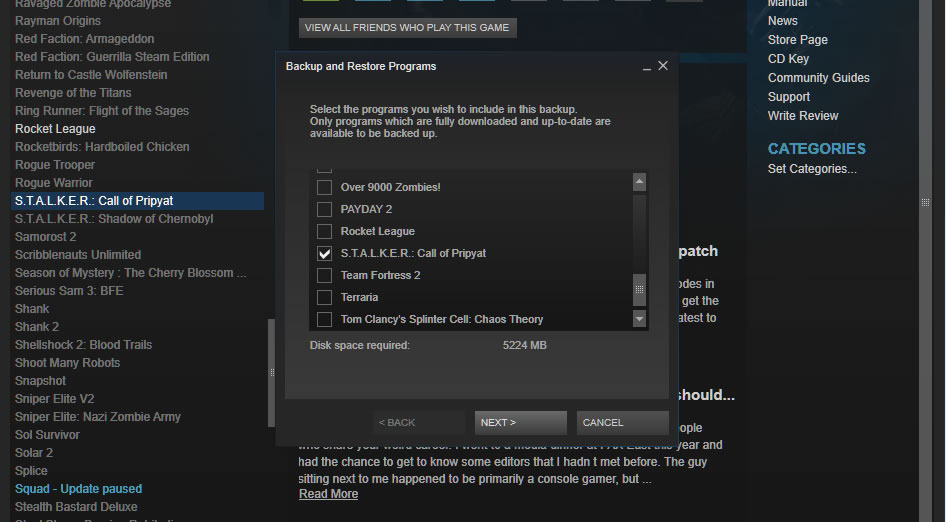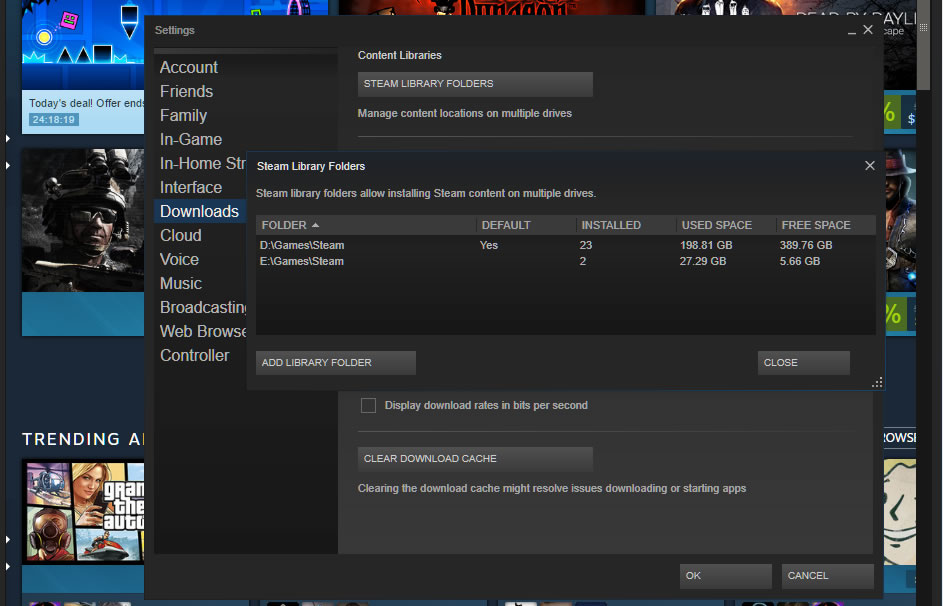Getting a New Jhard Drive How to Easily Transfer Steam Games Without Downloading Again
Although solid country drives have steadily increased in chapters, so too take the size of game installs. Today's triple-A titles commonly occupy upward of 20GB with many approaching or exceeding 60GB, especially afterwards accounting for downloadable content.
Ironically, information technology's often these large releases that do good the most from the improved load times of a speedy drive, which is probable to be filled faster than you lot'd expect if it's on the smaller side of SSDs -- due east.chiliad. a 250GB model would be stuffed with four GTA V-sized titles.
Fortunately, Steam has fabricated it easier to move games from one location to another, no longer requiring you to open a Windows command prompt or download 3rd-party tools, though we'll outline those methods, too, given that they nevertheless work.
Backing up your games...
This isn't mandatory but is nonetheless a worthwhile precaution. The nearly convenient way is simply copying your Steam or SteamApps folder (which is where your games are) to a backup directory via Windows Explorer. All the same, the Steam client besides provides an integrated backup and recovery process that will let you select installed titles and store them as fill-in files. The tool splits the game data into CSM/CSD files that are sized suitably for fitting on CDs and DVDs, though yous can also create 1 large save.
Getting there: Go to your Steam library > Correct click on a game > Backup game files... > Select the installed games to fill-in and follow the prompts from there.

To restore these files as installed Steam games, head to Steam > Backup and restore games... > Restore a previous backup > point information technology to your backup files > continue with the prompts.
Moving a single game between drives
- Become to Steam > Settings > Downloads > Steam Library Folders
- Make a new Steam library folder on the desired new drive (you can right click on one of these folders to prepare it as your default installation path, although the next fourth dimension y'all install a game, Steam volition ask where y'all want it to go).
- Motility an already installed game to the new bulldoze:
Right click on the game in your Steam library > Backdrop > Local Files tab > Motion install folder... > Choose the directory > Motility binder

I want to movement a game back off my SSD
The easiest way would exist repeating the concluding pace above past using Steam'southward integrated feature for moving installation folders, though this method works, too:
- Using Windows Explorer, motion the game folder from your SSD back to the original steamapps\common directory or another library folder that Steam recognizes.
- From Steam, right click on the game in your library and delete its local contents, which shouldn't actually delete anything considering yous only moved all the game files.
- Install the game again but point the installer to wherever you moved the files in step one, which should prompt Steam to verify the information and not download anything.
Moving your entire Steam install
- Close Steam and caput to your Steam folder or library via Windows (probably C:\Program Files\Steam (x86)).
- Copy and paste your Steam folder to the new location (rename the old folder and go out it in the original directory as a backup -- or delete it if desired).
- You tin can run Steam.exe from the new location or download and run the Steam installer and indicate information technology to your new location (this can help make clean upwardly shortcuts, etc).
Something isn't right with my Steam install!
- Copy and paste your SteamApps folder to a backup location
- Uninstall Steam
- Reinstall Steam and re-create your SteamApps folder back into the Steam installation directory
If a game has get decadent, you lot can too accept Steam automatically seek and bandy damaged files by verifying the integrity of your local data:
- Right click on the broken game in your Steam library > Properties > Local Files > Verify integrity of game files...
If it's been a while since you've done this, annotation that information technology doesn't completely freeze the Steam client anymore and then you can continue chatting etc.
The old style (no longer needed): Using mklink
Around the time SSDs were taking off (over a decade agone!), Steam didn't provide a born method for moving games between drives -- this characteristic was only added in 2017. Instead, gamers relied on the Windows command mklink, which links one directory to another so that when software interacts with location A, it's redirected to location B. In other words, Steam volition think the game is in its original directory, but information technology will instead run from the new drive.

This approach still works but is considered obsolete because of the features now built into Steam:
- Create the binder where you'd similar your game to be (example: D:\Games\Steam)
- Head to SteamApps (C:\Programme Files\Steam\steamapps\mutual) and cutting/paste the game you'd similar to move to the new drive (you don't desire to leave a copy of the game in your onetime directory)
- When the file transfer finishes, open the Windows command prompt and enter mklink /d "LINK" "TARGET" -- (case: mklink /d "d:\games\steam\steamapps\common\fullmojorampage" "e:\games\steam\steamapps\common\fullmojorampage")
Undoing that link is as uncomplicated as deleting the link in C:\Steam\steamapps\common.
Tip: Yous should exist able to see the link you lot made by inbound the dir command.
Other older tools for moving/bankroll up games
Download Steam Mover -- Earlier Valve'south customer could handle information technology, this was the go-to utility for moving Steam games to a new drive. It offers an easy interface to relocate your games and create a link in Windows (like the manual mklink arroyo outlined higher up). Version 0.ane of Steam Mover was released in Apr 2010 and although it's never received an update, information technology has accumulated hundreds of thousands of downloads in that time and it's rare to find a complaint.

Download SteamTool Library Manager -- Functionally identical to Steam Mover -- both by interface design and in methodology, relying on NTFS junctions to create a link between the new and old locations (note that this as well means it only works on NTFS partitions).
Download Gamesave Manager -- GSM can automatically observe the relieve data for 4,764 games and makes it easy to backup, restore and transfer game saves. However, the utility besides provides other features including the ability to motion Steam games (it besides uses symbolic links or NTFS junctions).
Source: https://www.techspot.com/article/1429-move-steam-game-library/